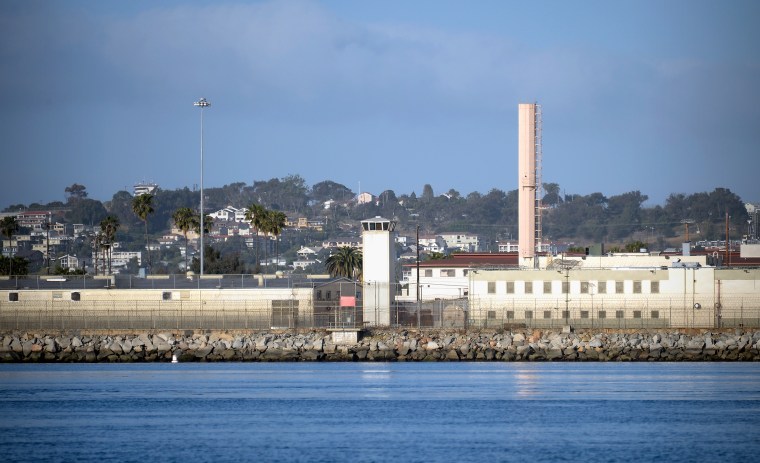More than a week has passed since Lyndsay Harrington has heard from her brother, who is locked up at a federal prison in California that houses inmates with health problems.
“We’re just so scared,” Harrington said.
She has good reason to worry.
Some 600 inmates at FCI Terminal Island, roughly 57 percent of the total inmate population, have tested positive for the coronavirus, officials said. Five inmates have died after contracting COVID-19, including three in the last 48 hours, and at least 10 staff members have been infected.
Harrington said her brother is particularly vulnerable because he suffers from asthma and a thyroid condition.
“We don’t want this to turn into a death sentence for him,” she said of her brother, who is also bipolar.
Like others interviewed for this story, Harrington asked that her sibling not be named because her family fears prison staffers could retaliate against him.
Detention facilities across the country are struggling to contain severe outbreaks of the virus, but the stakes are especially high at places like FCI Terminal Island.
The low-security prison in Los Angeles houses prisoners who have complex medical or mental health conditions but do not require 24-hour nursing care.
The facility has far and away more confirmed COVID-19 cases than any other prison in the federal system, but it’s also one of the few where 100 percent of the inmates are being tested for the virus.
"As machines and test kits become more accessible to us, we are expanding testing of asymptomatic inmates at facilities experiencing wide-spread transmission," Bureau of Prisons Director Michael Carvajal said in a video message to staffers on Wednesday.
Carvajal said Terminal Island is one of a handful of federal facilities that are working with local health departments or the Centers for Disease Control and Prevention to assist in testing all inmates.
The more comprehensive testing began on April 23 as part of an effort to isolate sick inmates and mitigate the spread of COVID-19. Only 10 percent of the inmates who have tested positive are exhibiting “outward objective symptoms,” such as coughing or fever, officials said.
The facility has set up 200 beds in “alternative housing” and has repurposed the prison industry factory and visiting room for inmate housing, a Bureau of Prisons spokesman said in a statement.
David Fathi, director of the American Civil Liberties Union National Prison Project, said the surge in positive cases at Terminal Island represent the “tip of the iceberg” in regard to the pervasiveness of the coronavirus in the American prison system.
Fathi said the lack of widespread testing means “we really have no idea” how many people inside detention facilities have the virus.
“If the prisoner gets it today, the prison staff gets it tomorrow and it will be in the community the day after that,” Fathi said. “It’s not just a prison health emergency. It’s a public health emergency.”
FCI Terminal Island has barred inmates from using prison phones and computers to help curb the spread of COVID-19. But the move has compounded the strain on the prisoners’ families, many of whom are now in the dark over the health of their loved ones.
Tiffany Holloway said she last spoke to her father, who suffers from congestive heart failure and is locked up on financial fraud charges, about two weeks ago.
“He sounded scared,” she said. “It was in his voice.”
Holloway said she felt conflicted about speaking out because she fears it could harm her father’s chances of securing an early release.
Earlier this month, Attorney General William Barr directed the Bureau of Prisons to release to home confinement those inmates who were particularly vulnerable to the disease and who are deemed to no longer pose a threat to the public.
“We constantly live in fear as family members because we don’t want to make the wrong move,” Holloway said.
In his last message to her, Holloway’s father expressed alarm over the outbreak at the prison and wondered why he wasn’t being fast-tracked for release.
“It is here. There is nothing I can do,” he wrote in the email dated April 8.
“I have past heart issues. I have no idea what this will do to me,” he added. He signed off the email with two words: Please help.
Prison officials said the five Terminal Island inmates who succumbed to COVID-19 had pre-existing medical conditions.
Leonard Auerbach, 73, died on Thursday at the local hospital where he arrived a week earlier suffering from a fever, chills and other symptoms, officials said. He was serving a 15-year sentence for production of child pornography.
The two prisoners who died on Wednesday were Rex Damon Begay Sr., 80, and Stephen Cino, 54.
Begay, who was serving a 10-year sentence for child sexual abuse, had tested positive for the virus on April 19. Cino, who was serving a 23-year sentence for conspiracy to distribute drugs and money laundering, tested positive on April 23.
Michael Fleming, 59, died April 19 at a nearby hospital 11 days after he was found to have COVID-19, officials said. He was serving a 20-year sentence for conspiracy to possess with intent to distribute methamphetamine.
Bradley James Ghilarducci, 73, died from the virus on April 13. He was serving an eight-year sentence for receiving and distributing a “visual depiction” of child sexual abuse, officials said.
Harrington's family last heard from her brother in a letter dated April 22.
“I’m not sure how long we will be like this,” he wrote. “No phone, no email, no rec, etc. It’s best I don’t get the virus though.”
Harrington's brother is serving a nine-year sentence on bank robbery charges. His current release date is October 2022, but his family is hoping that he, too, will be let out early for home confinement given his health problems.
“Hope you guys figure out how to get me home,” he wrote in his letter. “They have disabled us here obviously. Love you all very much. Be healthy and safe.”

